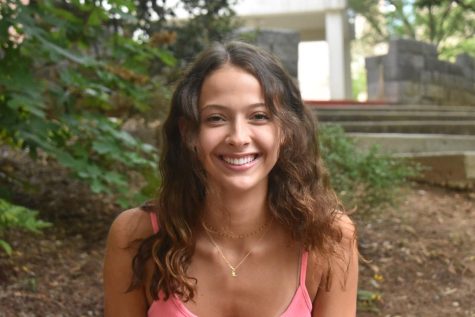Teachers grapple with use of AI in classrooms

Teacher concerns about the usage of AI systems like ChatGPT in classrooms are growing as the technology advances rapidly.
May 16, 2023
As Artificial Intelligence makes inroads into education, Midtown teachers are grappling with its implications in the classroom, seeing both advantages and pitfalls to its use.
“I’m cautiously optimistic,” Creative Writing and AP Literature teacher Susan Barber said. “I think it’s going to make some changes in education, but I think the changes are ones that have been needed for a while.”
AI is used to perform tasks like reading and writing by mimicking the cognitive abilities of humans. The machine learning systems draw from large amounts of data to learn behavior patterns and solve problems. With the ability to generate responses to essentially any prompt, some believe AI could, and is already beginning to, replace certain aspects of human function, particularly as it becomes more complex.
“I’m looking forward to learning more about it and how educators can adapt to this,” AP Human Geography teacher Chris Wharton said. “It’s awfully fascinating, but also in some ways, it’s unlike anything we’ve dealt with before as far as how students learn and the shortcuts that students will sometimes take.”
There are concerns AI could hinder cognitive development in students, as it can be used to shortcut assignments like lab reports and essays. Wharton said he is fascinated and slightly disturbed by how quickly AI is advancing. With technology in the picture, he said it can be difficult to differentiate between authentic and AI-generated work.
“My biggest concern is that the students will use it as a shortcut to developing their ideas and figuring out how to express them effectively in writing,” Wharton said. “If there is a program that can take some bits and pieces of information and do that for you, and you don’t go through the intellectual process of processing information: tying different concepts together, and how to express it well in writing, that’s a concern.”
To ensure students are producing their own work, many assignments in Wharton’s class are handwritten. He’s able to ensure that students aren’t using AI for their assignments as he can see whether a student is on their computer during class.
“Beyond the classroom, even if they handwrite, I don’t know if it’s been generated, and they’re copying,” Wharton said. “I don’t know how I would deal with that. My big concern is things that go beyond the classroom: projects and things like that – will their ideas be authentic? Because If their brain isn’t processing it, then the point of the assignment in some ways goes by the wayside because by doing it, you’re learning, and if something else is doing the thinking for you, how much are you learning?”
Barber said most of her assignments are done on paper, aside from a monthly blog students are expected to complete. Barber has been able to learn what her students’ individual voices are through in-class essays written on paper, so she recognizes when a student submits work that doesn’t follow their usual writer’s voice. Barber said, when grading the blog assignments, she notices when many read the same structurally and lack personality.
“One word that stood out to me that ChatGPT uses a lot in these poetry analyses is the word ‘evocative,’’ Barber said of a recent assignment. “So, in January, I had 10 posts come up with the word ‘evocative,’ and I’m like, ‘that’s weird.’ So then I type in [the prompt] to ChatGPT to check it, and sure enough, ‘evocative’ comes up in the response that it generated for me.”
In response, Barber has altered the directions of her blog assignment to include personal connections, something that AI cannot produce since the systems take data from the internet and cannot detect the individual’s personality. She has discussed the implications and limitations of AI with her students, saying it cannot replace personal creative writing.
“Right now, we’re still just trying to figure it all out,” Barber said.
Barber recently participated on a panel, hosted by the Atlanta Journal-Constitution, where educators discussed AI usage in schools.
“I do think we’re going to have to shift our pedagogy,” Barber said. “I really think it’s going to change the way we teach writing because now we’re not just asking for the final product. I think teachers are going to have to look at the process a lot more, because you can plug into ChatGPT, and it’ll just give you the product, but if we’re really wanting to teach thinking, teachers are going to need to be involved in steps along the way.”
Junior Ava Gold is in Barber’s creative writing class and experiments with platforms like ChatGPT outside the classroom.
“I think the thing that really made me interested in [AI] is a recent South Park episode,” Gold said. “In the new season, there is an episode about ChatGPT, where one of the main characters uses AI to respond to his girlfriend’s texts. Obviously, it’s satirical, but I do think it is a commentary on what’s happening now: that people are using AI to phase out actual human activities.”
ChatGPT can be used like a search engine without links to external sites. One can ask ChatGPT for a chocolate cake recipe, information on what to do in Atlanta or to give them song recommendations.
“I feel like the way people are thinking about AI is like, ‘oh, it’s going to replace having to write essays and doing assignments, but I think what it is, in essence, is replacing the internet itself,” Gold said. “Often if I’m searching for something, I won’t google it; I’ll ask ChatGPT.”
As of right now, writing AI produces doesn’t have much of a personality, but the technology is evolving rapidly.
“In the future, I think it’s going to get a lot more advanced,” Gold said. “It’s going to be able to include more details as it grows because the more information people input, the more it learns. I think, in the future, it’s going to be able to write longer form essays, be able to write novels; it’ll be able to do a lot more creative things.”
Rick Clark, admissions director at Georgia Tech, said that since students are becoming more familiar with platforms like ChatGPT, AI usage in college essays will increase in the future, and technology is advancing faster than humans can keep up with ways to combat it. Clark said to detect AI usage, colleges can include a supplementary question in their application asking whether the individual used AI and the extent to which they used it.
“As ChatGPT continues to iterate, and as more of these things emerge, you’re never going to be able to [detect AI],” Clark said. “And trying to dump 53,000 applications into some reverse AI thing, what is the point? So, I think if you’re a school that cares so much to know that the student had zero help from AI, all you can do is ask the question and trust the answer.”
From a college admissions standpoint, Clark thinks people have to recognize that AI is part of the ever-changing world, so all humans can do is figure out ways to work with that and use AI responsibly. He said responsible usage consists of using AI as a template and altering the product to make writing more personalized, as well as using AI to edit writing.
“Maybe one of the best parallels to this is the calculator,” Clark said. “[Teachers] were freaking out about ‘the calculator is going to ruin everything; kids aren’t going to be able to do math.’ And what you find is, a calculator helps you do simple things, but it’s only as good as the user itself. If you don’t know how to do calculus, having a calculator in your hand is not really going to help you … it’s not doing complex things unless you are a complex thinker. And I think that’s really true of AI as well.”
As long as the CommonApp keeps the college essay, Clark said many schools will continue to use it to learn more about applicants, but its importance may be diluted in the future.
“At least for Georgia Tech, I think [AI usage] is okay, because we still know the type of student you are from your transcripts; we still know what you want to say and care about from whatever you’re submitting, and there’s enough other things about you as a person and as a student that drive how we make admissions decisions,” Clark said.
AI like ChatGPT has purposes beyond shortcutting that Barber said can be beneficial for individuals to improve their writing.
“One of the most positive things for English, and that’s really what I know most about, is that you can plug your writing into it and ask it to revise your writing,” Barber said. “And so, now, the teacher doesn’t become like the bottleneck for feedback. And the more specific you are with what you prompt it, the more specific feedback you’ll get. So, I could say ‘revise this paragraph to have a more empathetic tone,’ or ‘revise this paragraph to have more sentence variety.’”
Although AI has a lot of capabilities, teachers encourage students to use the technology with caution.
“I would just encourage students not to be tempted by the shortcut because, ultimately, if you’re not learning how to think, that’s going to come back and not age well for you,” Barber said. “Just think about, ‘how can I integrate this to make my life easier, but not cheat my way through?’ For educators, or even parents, just play around with it and think through what possibilities are and listen to what’s out there about it.”






